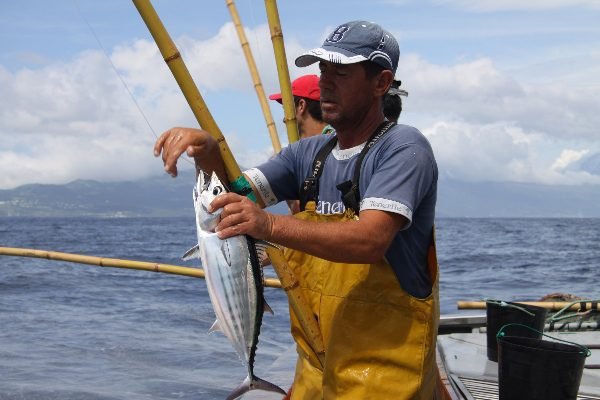This article first appeared in our ‘Why organic is the answer’ issue of My Green Pod Magazine, distributed with The Guardian on 03 September 2021. Click here to subscribe to our digital edition and get each issue delivered straight to your inbox
A number of reports have exposed the dark side of fishing, often suggesting we should all stop eating seafood.
Seaspiracy revealed over 300,000 whales and dolphins are killed every single year as ‘by-catch’ – the collateral damage caused by industrial fishing.
Plastic pollution is another problem; ‘ghost gear’ – lost fishing gear, mostly plastic – adds around 1 million tonnes of waste to the ocean each year.
Abandoned, lost and discarded fishing gear (ALDFG) causes 70% of marine animal entanglements and can be linked to 30% of some fish species’ decline.
For Charles Redfern, founder of Fish4Ever, the version of sustainable fishing that most companies and many organisations support is far too weak, as Seaspiracy argued.
But he says the documentary went on to conflate two very different moral issues: the issue of sustainability and the issue of eating – and therefore killing – animals.
For Charles, the idea there is no such thing as sustainable fishing is a falsehood that badly lets down many campaigning organisations and experts, some of whom were featured in the film, and the hundreds of thousands of small-scale fisheries that rely on fishing for food and income.
If we tar everyone with the same brush, Charles argues, we do a huge disservice to those who are trying to make a difference.
‘3 billion people in the world depend on fish as their primary source of protein’, Charles tells us. ‘That’s a huge percentage of the global population of just under 8 billion. When fished sustainably – which in theory is possible – fish self-renew, making them an infinitely renewable resource.’
What is sustainable fishing?
We can’t untangle the notion of sustainable fishing without first asking who’s responsible for its definition.
The mainstream marker of sustainable wild fish is currently enshrined in the Marine Stewardship Council’s (MSC’s) blue tick.
Tuna is an iconic species in the world of fishing sustainability and in terms of volumes one of the top three fish species caught globally. ‘When we started’, Charles remembers, ‘every can in the world had a dolphin friendly label. By and large it’s a con.’
The practice of ‘setting on’ dolphins was only really used off the coast of Mexico when fishing for yellowfin tuna. This represented less than 2% of the total tuna caught, and in the UK canned tuna is skipjack, not yellowfin.
‘The logo might as well be on chocolate’, Charles tells us; ‘it’s completely irrelevant.’
What is relevant is how the industry has changed since the 1960s; total annual catch is five times larger, and we use bigger boats and more sophisticated methods.
Huge quantities of tuna – as well as endangered species such as turtles, whales, sharks, other fish species and a vast number of juvenile tuna – are caught in gigantic purse seine nets the size of football pitches.
‘Back then it was dolphin friendly’, Charles tells us, ‘now it’s MSC. 30% of the world’s tuna catch is now blue tick certified – with a further 20% under assessment. But it’s caught using the same boats, the same ownership and the same fishing methods that have been criticised over the last 20 years.’
Fishing by and large is predicated on the concept of maximum sustainable yields (MSY): ‘You try to extract as much fish as you possibly can without crashing the stocks and try to row back when there are signs of overfishing’, Charles explains.
Yet with climate change, impacts on ecosystems and the notoriously complicated nature of modelling stock behaviour, fishing at MSY is no guarantee of sustainability.
 Play Video about This Rock Might Just Save The World
Play Video about This Rock Might Just Save The World Play Video about Play 2 hours of rock
Play Video about Play 2 hours of rock Play Video about Play 2 hours of brook
Play Video about Play 2 hours of brook Play Video about Play 2 hours of sheep
Play Video about Play 2 hours of sheep











































